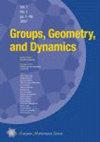Invariable generation does not pass to finite index subgroups
IF 0.6
3区 数学
Q3 MATHEMATICS
引用次数: 4
Abstract
Using small cancellation methods, we show that the property invariable generation does not pass to finite index subgroups, answering questions of Wiegold and Kantor-Lubotzky-Shalev. We further show that a finitely generated group that is invariably generated is not necessarily finitely invariably generated, answering a question of Cox. The same results were also obtained independently by Minasyan.不变生成不传递给有限索引子群
利用小消去方法,我们证明了性质不变生成不传递给有限指数子群,回答了Wiegold和Kantor-Lubotzky-Shalev的问题。我们进一步证明了一个总是生成的有限生成群不一定是有限总是生成的,这回答了Cox的一个问题。Minasyan也独立获得了相同的结果。
本文章由计算机程序翻译,如有差异,请以英文原文为准。
求助全文
约1分钟内获得全文
求助全文
来源期刊
CiteScore
1.10
自引率
0.00%
发文量
45
审稿时长
>12 weeks
期刊介绍:
Groups, Geometry, and Dynamics is devoted to publication of research articles that focus on groups or group actions as well as articles in other areas of mathematics in which groups or group actions are used as a main tool. The journal covers all topics of modern group theory with preference given to geometric, asymptotic and combinatorial group theory, dynamics of group actions, probabilistic and analytical methods, interaction with ergodic theory and operator algebras, and other related fields.
Topics covered include:
geometric group theory;
asymptotic group theory;
combinatorial group theory;
probabilities on groups;
computational aspects and complexity;
harmonic and functional analysis on groups, free probability;
ergodic theory of group actions;
cohomology of groups and exotic cohomologies;
groups and low-dimensional topology;
group actions on trees, buildings, rooted trees.

 求助内容:
求助内容: 应助结果提醒方式:
应助结果提醒方式:


